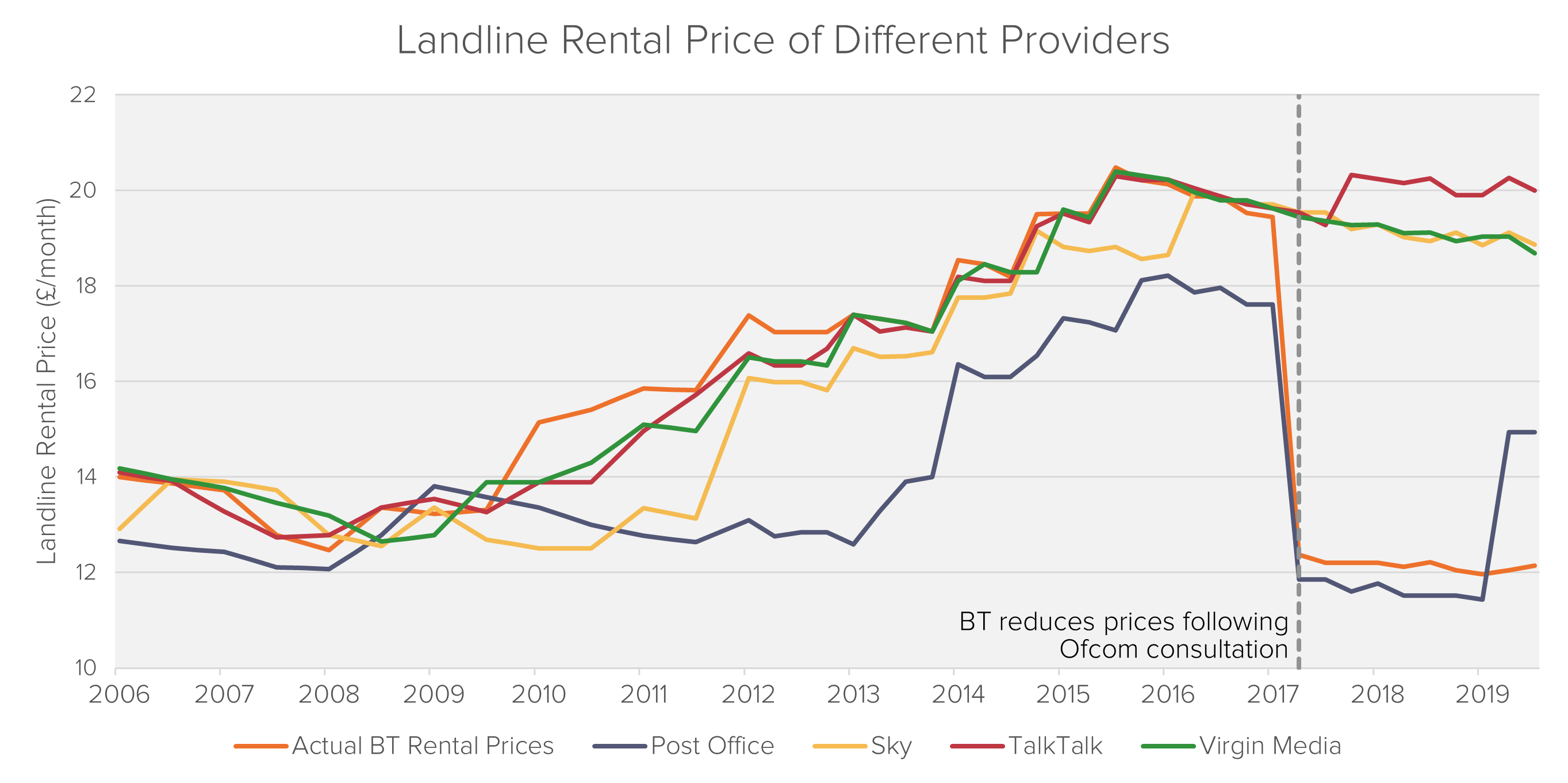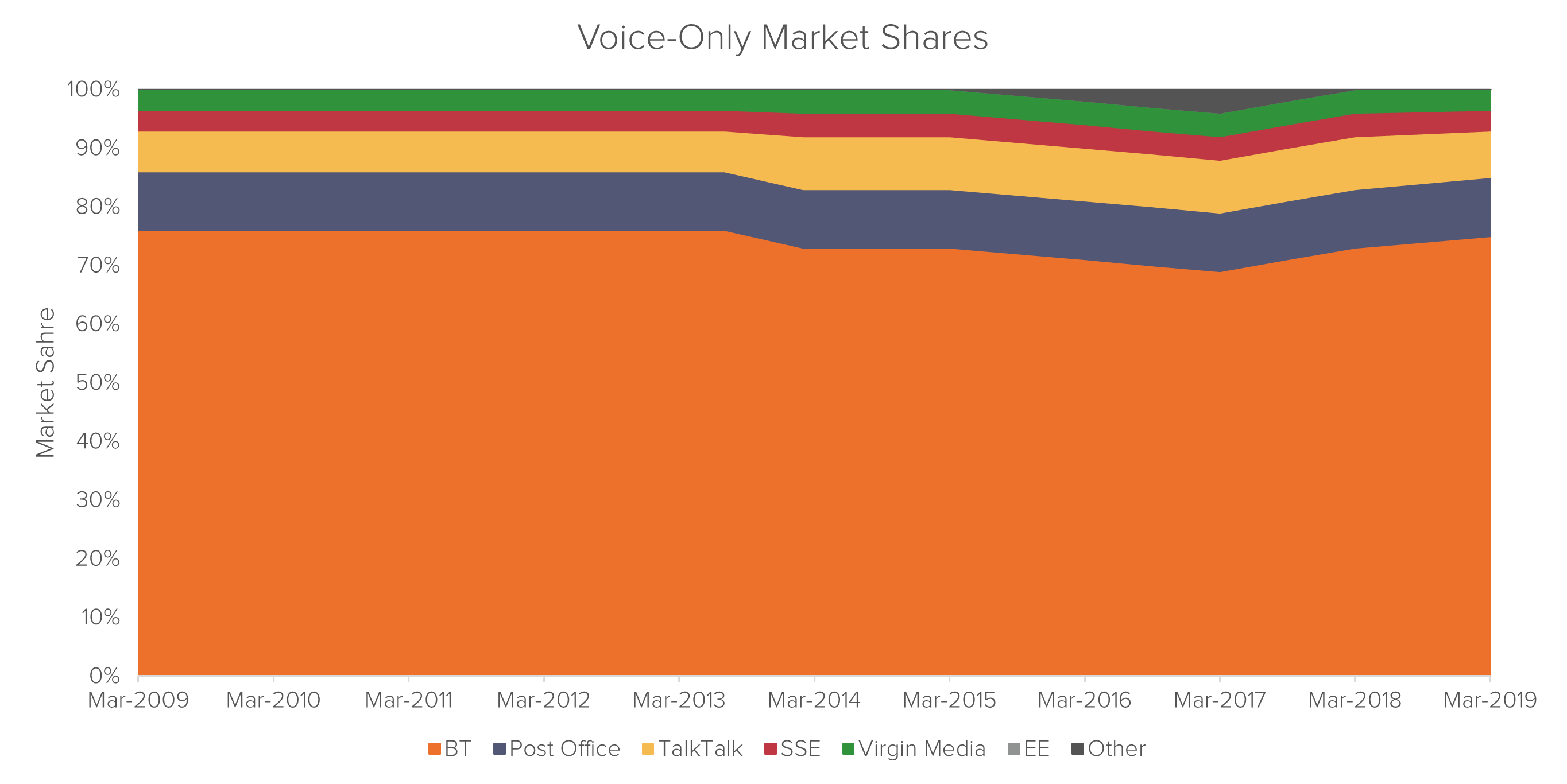
Research
Specs For SPACs
What the Clover Class Tells Us About Keeping a SPAC Case on Track

In 2017, Ofcom found that BT had overcharged voice-only residential landline customers. It observed that these customers had been exposed to increasing line rental prices since 2009, despite falling wholesale prices.1 Following the consultation, BT put forward a voluntary proposal and lowered prices effective April 2018 from £18.99 per month to £11.99 and pegged further price increases to CPI.2
Among BT’s competitors, none except the Post Office implemented similar price reductions:
 Source: Ofcom and Fideres’ Calculations
Source: Ofcom and Fideres’ CalculationsDespite the opening of a large gap in prices, there was no commensurate impact on BT’s market share. BT’s market share did rise marginally from 69% to 75%, but this was still below its peak in 2013, and incommensurate with the scale of its 36.8% price reduction.
We note that Talk Talk and others maintaining the same prices while BT/Post Office reduced prices by 36.8% is equivalent to Talk Talk and others becoming 62% more expensive than BT. If these firms competed in the same relevant antitrust market, such price discrepancies would have triggered substitution between the firms. However, no such substitution occurred:
 Source: Ofcom3 and Fideres’ Calculations
Source: Ofcom3 and Fideres’ CalculationsVoice-only customers rarely change their provider. According to the 2016 Ofcom Switching Tracker, only 6% of voice-only customers had changed their provider in the past year, while 74% had used the same provider for the past 10 years, and 86% for the past 5 years.4 This sets voice-only customers apart from other landline purchasers, who change their provider far more frequently.
We apply Critical Loss Analysis to define the relevant antitrust market(s). We find that, given a 62% relative price increase, 60% of those consumers purchasing from rival firms would need to switch providers for us to conclude that BT/Post Office are in the same market as TalkTalk, Virgin, and others.5 Otherwise, it is profit-maximizing for Talk Talk and others to maintain their inflated prices.
However, according to Ofcom’s Switching Tracker, in 2019 only 7% of consumers had switched their provider within the past three years. Even if we conservatively assume all these consumers switched after 2018, and that all switched to BT/Post Office from Talk Talk, Virgin, etc., this would only constitute 33% of their 2017 volume.
These switching levels are therefore simply too small to provide any incentive for the firms to cut their prices. Although a small number of consumers did change their provider following the price reduction, this was inadequate to constrain Talk Talk and others from continuing to set their prices at a level that Ofcom had already identified as excessive.
This analysis suggests that the only way Talk Talk and Virgin can argue that BT/Post Office are in the same market, is if they had actively chosen not to maximize profit since 2018.
Given a dominant position over their customers, each firm has a legal responsibility under UK Competition Law to refrain from unfair or abusive pricing practices. Normally, it is difficult to determine what a “fair” market price might be in a monopolized market given the lack of a competitive counterfactual, but here Ofcom’s finding, and BT’s voluntary price reduction provides a clear benchmark.
This is a particularly strong benchmark given that other landline providers see the same wholesale cost as BT – they all rely on Openreach network.
Using BT’s price reduction as a benchmark, we estimated overcharge by Talk Talk and Virgin. The estimates below assume that the overcharge began in 2009 (when BT began increasing prices), ultimately achieved the same level (£7 by 2017) and has persisted through to the present. We use linear interpolation to approximate overcharge figures for earlier years, assuming a steady increase in the overcharge from £0 in 2008 to £7 in 2017:
| Estimated Total Subscription Months, 2009 - 2021 | Estimated Total Overcharge (Since 2009) | Estimated Total Overcharge (Since 2015) | |
| SSE | 14 m | 48 m | 25 m |
| Virgin | 14 m | 48 m | 25 m |
| TalkTalk | 29 m | 103 m | 57 m |
| Total | 57 m | 198 m | 107 m |
Moreover, this overcharges disproportionately falls on elderly consumers, who constitute the vast majority of voice-only landline customers. As Ofcom put it:
“The effect of the increase in line rental prices has a particular impact on elderly consumers. As Figure 4 shows, over 40% of voice-only consumers are over 75. Moreover, this group of consumers is generally more disengaged.”6
Further, 66% of voice-only customers were 65 or older, and 80% were 55 or older.7 Because age is a protected characteristic under the Equality Act, levying supra-competitive prices which disparately impact elder consumers may constitute illegal indirect discrimination.
Paul joined Fideres after completing a BSc in Economic History at the London School of Economics and Political Science. At LSE, Paul was a Trustee of the Student Union and President of the Music Society, having previously performed with two national choirs in the US. At Fideres, Paul leads our discrimination practice, analysing cases of algorithmic and indirect discrimination, in addition to his work in the Competition team, where he is a project manager. On the Competition team, Paul’s work spans financial markets, with his research on bond market manipulation published by the ABA, digital markets, and industrial organisation.

What the Clover Class Tells Us About Keeping a SPAC Case on Track


Evidence of collusive behaviour In academic publishing.


Travel price discrimination.


London: +44 20 3397 5160
New York: +1 646 992 8510
Rome: +39 06 8587 0405
Frankfurt: +49 61 7491 63000
Johannesburg: +27 11 568 9611
Madrid: +34 919 494 330